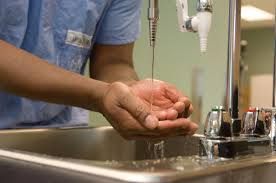When you have to be emitted to the hospital, you expect your medical condition to be resolved and not to acquire new complications. However, studies have found that  some patients are actually acquiring infections at hospitals, causing serious illness or even death. According to the data from the Centers for Disease Control and Prevention, as many as 1 in 25 hospital patients acquire a healthcare associated infection. This amounts to more than 720,000 patients a year. The CDC estimates that 75,000 people died because of hospital acquired infections in 2013 alone.
some patients are actually acquiring infections at hospitals, causing serious illness or even death. According to the data from the Centers for Disease Control and Prevention, as many as 1 in 25 hospital patients acquire a healthcare associated infection. This amounts to more than 720,000 patients a year. The CDC estimates that 75,000 people died because of hospital acquired infections in 2013 alone.
About half of the infections are contracted inside the ICU while the other half are contracted in the general care rooms or as a result of surgery. The most common infections that occur in hospitals include:
- Urinary Tract Infections (catheter use)
- Bloodstream Infections
- Surgical Site Infections
- Clostridium Difficile Infections (C-Diff)
According to the CDC, another infection found in hospitals or nursing homes and generally effects the elderly is MRSA. This a type of staph bacteria that is resistant to many antibiotics. In a healthcare setting, MRSA can cause severe problems such as bloodstream infections, pneumonia and surgical site infections.
When a patient contracts an infection while at a hospital, it is imperative that he or she receive immediate diagnosis and treatment. This is especially true of those who are at a higher risk for infection. It’s important that family members of an older patient with a catheter demand medical professional monitor the catheter regularly to ensure that an infection is not starting.
According to the CDC, some signs of hospital infection or MRSA are fever, fatigue, diarrhea and muscle aches. If the infection begins at a wound site the area may appear red, may ooze, and could be warm to the touch.
Medical doctors take a Hippocratic Oath that they will “reject harm and mischief” being ever so diligent in providing a high standard of care and do no harm. Hospital acquired infections should never occur if the doctor and his team are operating at their best, never cutting corners and being mindful of what they are doing at all times.
If you or a loved one have been the victim of hospital infection due to the negligence of medical professionals, you may be able to receive compensation for your pain and suffering. You should seek the services of an experienced personal injury lawyer to advocate on your behalf. Contact attorney Michael Pence to schedule your consultation.


